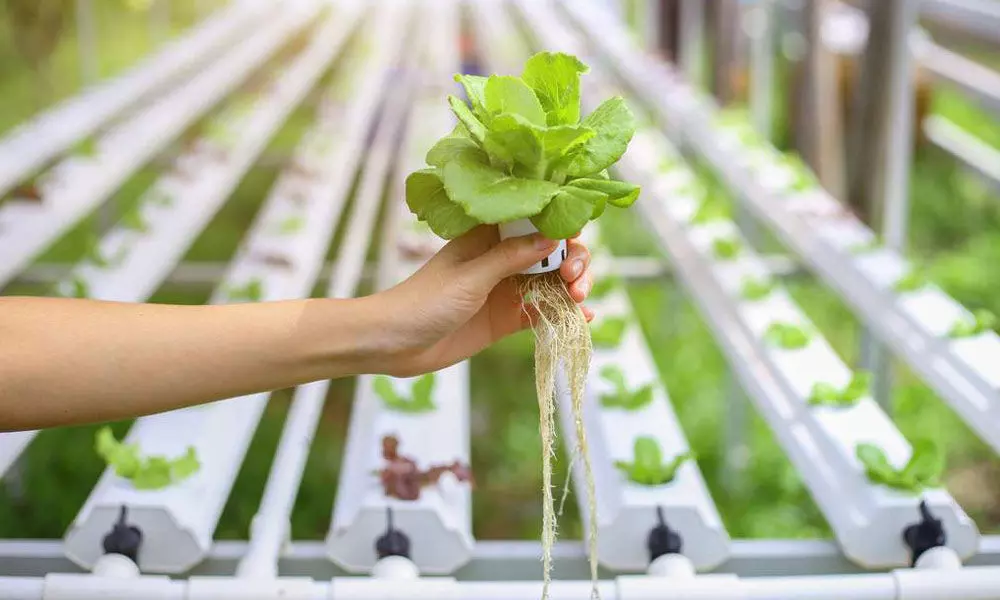Hydroponics, the future farming model?
Urban hydroponic farms reduce food's carbon footprint, while also ensuring a year-round supply of fresh produce says, Amit Kumar Verma, CEO at Brio Hydroponics & Brio Agri Producer
image for illustrative purpose

Dipping Toe In The Water
- 2 out of every 3 individuals projected to reside in urban areas
- Producing fresh greens and vegetables close to urban populations could help meet rising global food demand
- Streamlining distribution chains to reduce emissions
- Providing higher-nutrient produce
- Substantially reducing water usage and runoff
While India is in the midst of farmers' strike, young entrepreneurs working hard to address some of the main problems of agriculture sector
Mumbai: The interest in hydroponics appears to have been sparked by the Covid-19 problem. Hydroponic farming, which is now thriving all over the globe, provides a viable answer to many of the world's current agricultural issues.
According to research, the global hydroponics market would be worth $17.9 billion by 2026. Although the technology is still in its infancy in India, there are indicators that it is on the rise.
According to a February analysis by DataM Intelligence, a Hyderabad-based market research and business intelligence organisation, by 2050, food production would need to grow by about 70 per cent to fulfill the caloric needs of a global population of 9.8 billion people, with 68 per cent of them expected to live in urban areas, says a report. Even while the country is in the midst of a farmers' strike, young entrepreneurs are working hard to address some of the sector's main problems. That is, two out of every three individuals are projected to reside in urban areas. Producing fresh greens and vegetables close to these growing urban populations could help meet rising global food demand in an environmentally prudent manner by streamlining distribution chains to reduce emissions, providing higher-nutrient produce, and substantially reducing water usage and runoff.
To generate economic prospects for the hundreds of millions of rural people who rely on agriculture for a living, as well as to mitigate environmental impacts such as ecosystem deterioration and excessive greenhouse gas emissions.
Traditional agriculture consumes enormous amounts of resources. With most crop production already at its genetic and chemical limits (significant increases in fertiliser or pesticide use would not improve yields significantly), intensification and land expansion for food production have been deemed as the only feasible alternatives for meeting these burgeoning food demands.
"Hydroponic farmers have traditionally used the term 'sustainability' to describe the promise that what they do today would not jeopardize future generations. Urban hydroponic farms reduce food's carbon footprint, while also ensuring a year-round supply of fresh produce," Amit Kumar Verma, CEO - Brio Hydroponics & CEO - Brio Agri Producer.
The startups facilitate for anyone to build commercially scaled soilless farms. Since its beginning in April 2020, it has established 15 commercial soil-less farms for vegetable cultivation in seven
Indian states: Gujarat, Maharashtra, Delhi, UP, Chhattisgarh, Uttarakhand, and Haryana. The agritech business encourages resilient farmers by providing agriculture simple, profitable, and sustainable through technology-driven solutions.
The challenge for hydroponic farmers like him is that the technology is still in its infancy, so finding the proper personnel, equipment, and processes is difficult. No approvals from the
government were required. A hydroponic farm's capex and opex are both greater than those of a soil-grown farm, resulting in higher selling prices. Wheat and rice, for example, will cost four times as much as soil-grown crops. However, as fresh water sources and arable land are to be depleted in a few decades, the transition to hydroponics will be much more obvious.
According to Verma, "We are the ideal group of people to assist climb towards a soilless future (both NFT based hydroponics as well as aggregate hydroponics), with years of expertise and handling many projects at varying stages. With the aim of producing agriculture a viable business by assisting small farmers, developing urban farmers, and preparing India for the future by providing safe and nutritious food alternatives by 2030."

